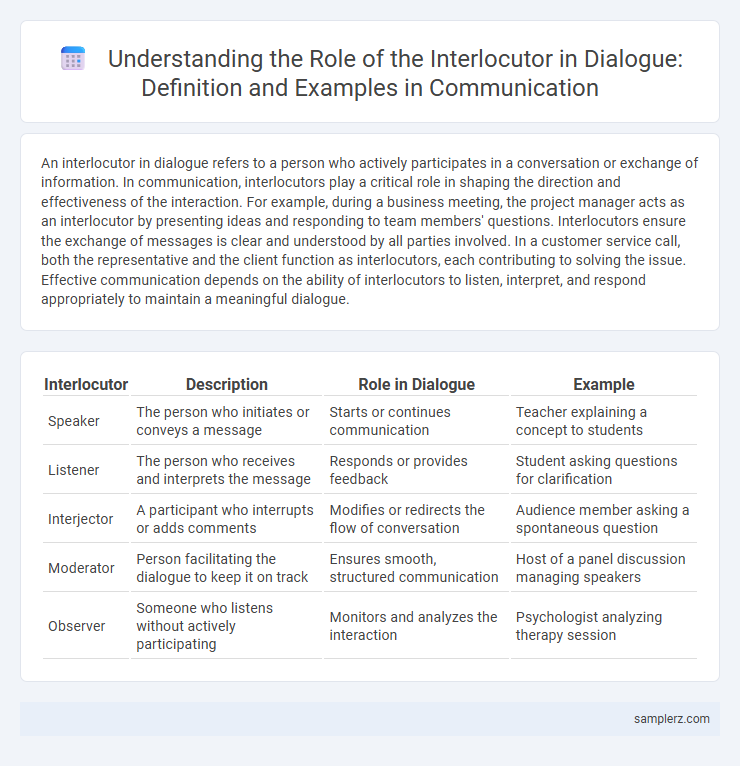An interlocutor in dialogue refers to a person who actively participates in a conversation or exchange of information. In communication, interlocutors play a critical role in shaping the direction and effectiveness of the interaction. For example, during a business meeting, the project manager acts as an interlocutor by presenting ideas and responding to team members' questions. Interlocutors ensure the exchange of messages is clear and understood by all parties involved. In a customer service call, both the representative and the client function as interlocutors, each contributing to solving the issue. Effective communication depends on the ability of interlocutors to listen, interpret, and respond appropriately to maintain a meaningful dialogue.
Table of Comparison
| Interlocutor | Description | Role in Dialogue | Example |
|---|---|---|---|
| Speaker | The person who initiates or conveys a message | Starts or continues communication | Teacher explaining a concept to students |
| Listener | The person who receives and interprets the message | Responds or provides feedback | Student asking questions for clarification |
| Interjector | A participant who interrupts or adds comments | Modifies or redirects the flow of conversation | Audience member asking a spontaneous question |
| Moderator | Person facilitating the dialogue to keep it on track | Ensures smooth, structured communication | Host of a panel discussion managing speakers |
| Observer | Someone who listens without actively participating | Monitors and analyzes the interaction | Psychologist analyzing therapy session |
Defining the Interlocutor in Dialogue
The interlocutor in dialogue refers to any participant actively engaged in the exchange of ideas, thoughts, or information. Identifying the interlocutor involves recognizing their role as a speaker, listener, or responder within the conversational context. Effective communication depends on understanding the interlocutor's perspective, intentions, and linguistic cues to facilitate meaningful interaction.
Key Characteristics of an Effective Interlocutor
An effective interlocutor actively listens and provides clear, concise responses that enhance mutual understanding. They demonstrate empathy and adaptability by recognizing the speaker's emotions and adjusting their communication style accordingly. Maintaining open body language and asking relevant questions fosters engagement and encourages a productive dialogue.
The Role of the Interlocutor in Communication
The interlocutor in communication actively shapes the dialogue by providing feedback, asking questions, and clarifying messages to ensure mutual understanding. Their role involves managing turn-taking, interpreting nonverbal cues, and adapting responses based on context and speaker intent. Effective interlocutors enhance communication by fostering engagement and reducing misunderstandings in both verbal and nonverbal exchanges.
Real-Life Examples of Interlocutors in Conversation
An interlocutor in conversation can be a customer service representative assisting a client during a support call or a teacher engaging with students in a classroom discussion. Real-life examples include a business partner negotiating terms during a meeting or friends exchanging ideas in a casual chat. These interlocutors contribute actively to the flow and meaning of the dialogue by responding, questioning, and providing feedback.
Interlocutors in Professional Settings
In professional settings, interlocutors often include managers, clients, team members, and stakeholders who engage in structured dialogue to achieve specific goals. Effective communication between these interlocutors relies on clarity, active listening, and appropriate tone to foster collaboration and decision-making. Understanding the roles and expectations of each interlocutor enhances productivity and conflict resolution during business interactions.
Interlocutor Dynamics in Cross-Cultural Dialogues
Interlocutor dynamics in cross-cultural dialogues reveal that understanding cultural norms and communication styles is crucial for effective interaction; for example, a Japanese interlocutor may emphasize indirect expressions and listening, while an American interlocutor often values directness and verbal assertiveness. Misinterpretations frequently arise from differing norms around pauses, eye contact, and turn-taking, impacting mutual comprehension. Successful cross-cultural communication requires adapting to these dynamics through active empathy and cultural literacy to foster meaningful exchanges.
Interlocutor as a Facilitator in Group Discussions
An interlocutor as a facilitator in group discussions guides conversation flow, ensuring each participant contributes effectively and stays on topic. By actively listening and posing clarifying questions, the interlocutor fosters mutual understanding and resolves conflicts. This role enhances collaborative decision-making and promotes a balanced exchange of ideas among group members.
Interlocutor Influence on Dialogue Outcomes
Interlocutor influence on dialogue outcomes is critical in shaping the direction and effectiveness of communication. For example, in a business negotiation, an interlocutor who demonstrates empathy and active listening can foster trust and collaboration, leading to a mutually beneficial agreement. Conversely, an interlocutor exhibiting dominance or dismissiveness may create resistance, hindering constructive dialogue and reducing the potential for positive outcomes.
Challenges Faced by Interlocutors in Complex Dialogues
Interlocutors in complex dialogues often encounter challenges such as misinterpretation of nuanced meanings, difficulty in managing overlapping speech, and maintaining engagement amid ambiguous or conflicting information. These obstacles frequently lead to breakdowns in communication and hinder effective information exchange. Overcoming such issues requires enhanced listening skills, clarification strategies, and adaptive conversational techniques.
Improving Communication Skills as an Interlocutor
An effective interlocutor actively listens and provides thoughtful feedback to enhance mutual understanding during dialogue. Utilizing open-ended questions encourages deeper responses and fosters a collaborative exchange of ideas. Practicing clarity in speech and maintaining empathetic body language significantly improves communication skills and strengthens interpersonal connections.

example of interlocutor in dialogue Infographic
 samplerz.com
samplerz.com